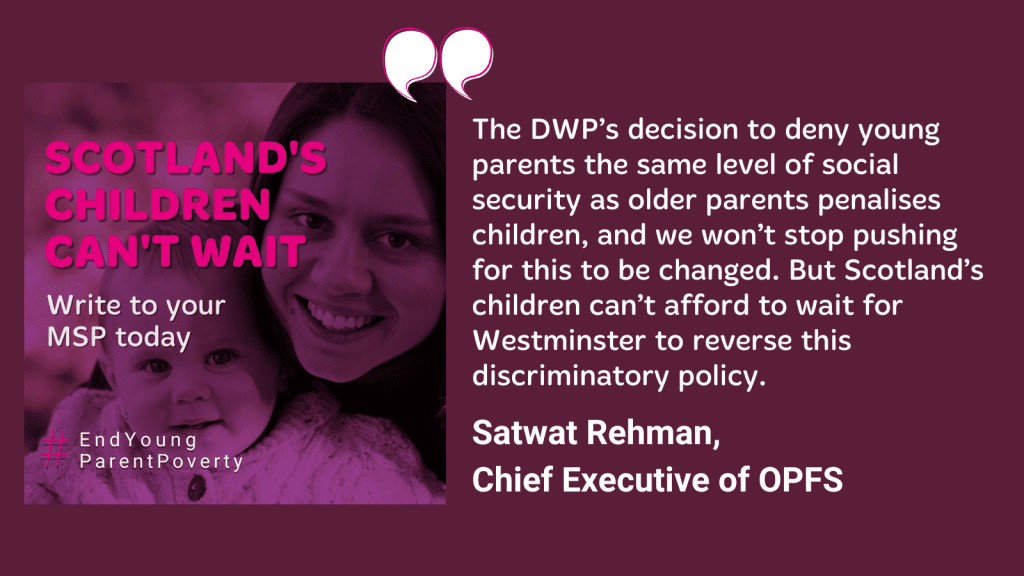Scottish Government told ‘children can’t wait’ for young parent social security top-up

26/04/2023
News
Led by One Parent Families Scotland, the campaigners say the move is essential to tackling the “staggering” child poverty rates in young parent families. 55% of children with a mum under 25 are in relative poverty and 49% are in absolute poverty.
Under the UK Government’s Universal Credit, under 25s receive a lower rate of benefits than over 25s in exactly the same circumstances. The result of this is that young couple parents are around £100 worse off per month and single parents are around £65 off a month worse off than over 25s.
The organisations behind the campaign, which include the Child Poverty Action Group, Engender, and Who Cares? Scotland, have called this a “young parent penalty” and are urging the Department of Work and Pensions (DWP) to scrap it.
However, the Scottish Government has been told that its own child poverty targets mean it has a responsibility to support these families.
The Scottish Child Payment currently provides £25 per week for every child under 16 in low-income families.
- Satwat Rehman, Chief Executive, OPFS
Satwat Rehman, Chief Executive of One Parent Families Scotland, said:
“Children with mothers under 25 face a staggering rate of child poverty – more than double the rate for all children.
“The Scottish Government has identified young mothers as a priority group for tackling child poverty. Now, it has a chance to turn those words into action by targeting support where it is most urgently needed.
“The DWP’s decision to deny young parents the same level of social security as older parents penalises children, and we won’t stop pushing for this to be changed. But Scotland’s children can’t afford to wait for Westminster to reverse this discriminatory policy.
“In our local services, we see young families being pushed to the brink by poverty. We also know that supporting these families when they need it most can have a lifelong impact.
“This is why we are asking the Scottish Government to provide a top-up to the Scottish Child Payment to make up the shortfall in benefits received by young parents.”
- Jill Wood, Policy Manager, Engender
The campaign to ‘End Young Parent Poverty’ is being backed by a broad range of organisations including Barnardos Scotland, Carers Scotland, Human Rights Consortium Scotland, Living Rent, Mental Health Foundation Scotland, Save the Children, and Scottish Women’s Aid.
A paper has been published today as part of the campaign which argues that Scottish Government commitments on child poverty, gender equality and supporting care-experienced young people mean providing financial support for young parents should be a priority.
Members of the public are being encouraged to write to their MSPs on the issue via a tool on the campaign website.
Feminist charity Engender’s Policy Manager Jill Wood said:
“The ‘young parent penalty’ within Universal Credit is deeply gendered and acts as a barrier to equality for young women. They are the majority of those affected, with disabled women, BME women, and other marginalised groups at greater risk of harm.
”Over 90% of single parents are women and the cost of living crisis is having devastating impacts on their financial security, and physical and mental health. The majority of young parents are also women, many of whom are in precarious situations. Financial autonomy and the ability to secure independent housing is crucial for young women experiencing or at risk of domestic and sexual abuse.
Scottish Government has clear targets to tackle gender inequality, violence against women and child poverty, and should act to provide young parents with this vital support.”
- Lauren, Young single mum, Glasgow
Lauren* is a 22-year-old single parent from Glasgow and lives with her 3-year-old daughter.
Commenting on the inequality in Universal Credit, she said: “I didn’t find out about the difference until I started attending the young parent group at OPFS Glasgow. We have to budget on so much less and it’s so hard.
“It’s like the government is telling young people they should struggle because we are younger and basically because of our age we don’t matter. I’m £800 in debt with gas. I only put heating on at night when daughter is in bed and the washing machine goes on at night.
“No job is going to work around the two hours per day I have of paid childcare. My daughter will get half day when she’s three. I’ve been offered a job as a support worker; I’m going to have to do nightshifts and my daughter will have to stay with her dad the full weekend and I won’t be able to see her. Working day shifts mid-week wouldn’t work around nursery.”
*Pseudonym